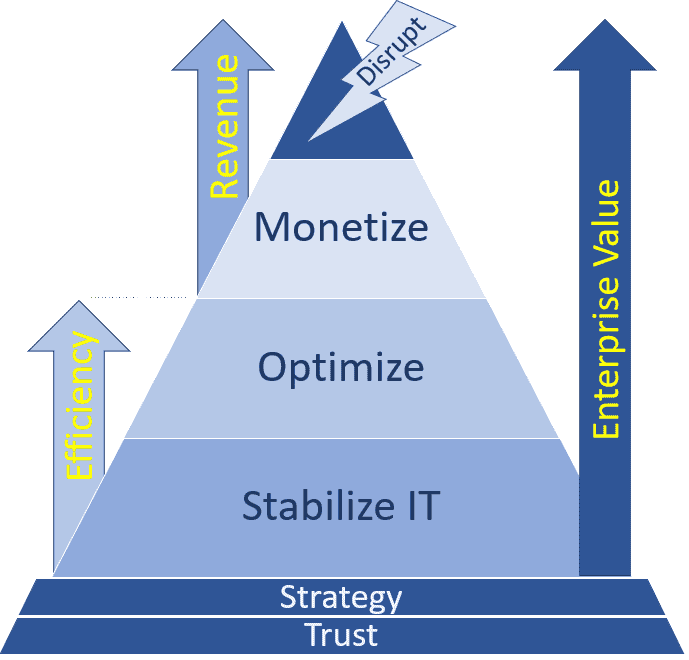Legal Services IT & AI Consulting
Proven IT Leaders with Track Records in the Legal Services industry
Legal Services IT & AI Experts
The legal profession is one of the pillars of our society — built on trust, confidentiality, and precision. Today, however, law firms and legal services organizations are being transformed by digital expectations, automation, and heightened scrutiny around data privacy. For technology leaders in this space, success means more than reliable systems; it requires a strategy that understands the unique demands of the practice of law.
Through our flagship Contract CIO+® tech leadership service and our foundational CIO IQ® IT & AI Advisory offering, Innovation Vista provides independent vendor-neutral IT & AI strategy to the Legal Services industry. Our consultants bring both deep technical expertise and first-hand experience guiding IT for law firms, courts, and government entities. We understand where general IT best practices apply — and where legal-specific nuances matter most, such as safeguarding privileged information, managing sensitive records, and enabling secure digital interactions for clients and stakeholders.
Unlike firms that assign consultants lacking industry context, our experts have supported legal organizations across private, public, and academic sectors. With Contract CIO+®, our goal is not just stabilizing and optimizing your technology platforms, but ensuring they align with your firm’s mission: delivering faster, more reliable service with the highest standards of security and professionalism.
State of Innovation in Legal Services
Our 2026 Summary of Innovation in the Legal Services industry
The GenAI “Tipping Point” & Model Shift
The legal industry has moved beyond the “hype” of Generative AI into rapid, widespread adoption. The question is no longer if AI transforms legal work, but how firms govern it effectively.
From Hourly to Value-Based: GenAI is automating drafting and research tasks that once fueled associate billable hours. Progressive firms are using this tech to transition toward flat-fee or value-based billing models, leveraging AI to protect margins.
The “Shadow AI” Risk: With associates turning to public AI tools, governance is a top priority. Firms are deploying private, secure AI environments (like Microsoft Copilot or proprietary LLMs) to ensure client privilege remains intact.
Cybersecurity as a Retainer Requirement: Corporate clients now demand rigorous security audits of their outside counsel. A firm’s cybersecurity posture is as critical to winning business today as its legal expertise.
Mid-Market Agility: While “Big Law” struggles with legacy inertia, mid-sized firms are utilizing cloud-native platforms to punch above their weight, using AI to deliver Tier-1 service at mid-market rates.
Interested in Leveraging Some of these Tech Capabilities? An Assessment Could Be Step 1.
Is your tech platform and organization ready to scale and advance? Many of our clients choose to start with an IT & AI Assessment and Recommendations report.
This is a high-leverage first step to gain actionable insights from our Legal Services tech consulting team, validate your current IT and AI readiness, and discover how our expert collaboration can drive value for your organization’s future.
Legal Services Leaders First - Then Tech Leaders
Our Unique Approach to Legal Technology
Like many consulting firms, we help legal organizations with Stabilizing their IT infrastructure, strengthening network security, and Optimizing architecture, service delivery, and budgets. Those elements are critical — but they’re not enough on their own.
With Contract CIO+® and CIO IQ®, we begin by aligning IT strategy with your broader objectives. For a law firm, political campaign, or government entity, the “right” technology plan looks very different depending on priorities: protecting sensitive records, enabling digital case management, or improving client and citizen engagement. Our consultants understand these nuances because they’ve led IT across every corner of the legal sector.
Where we create the most long-term impact is in Monetizing technology. We help clients Innovate Beyond Efficiency® by identifying ways to use IT and data to elevate service delivery, accelerate workflows, and even open new avenues for value creation. That might mean enabling secure client portals, automating discovery processes, or deploying analytics to strengthen case strategy and decision-making. For legal leaders, the payoff is not only lower costs but also stronger reputation, greater efficiency, and a competitive edge in service quality.
IT Strategy for Your Legal Niche
Legal Sectors Covered
- Law firms
- Political campaigns
- Municipal courts
- Legal public services
- Law schools
- Local government
- State government
- Federal contractors
- Government contractors
- Records Management
- Lobbying organizations
- Special interest groups
- Custom software development
Latest Legal Tech !nsights from Our Team:
Analytics Maturity in Legal Services · Analyzing our Mid-market Survey
Our CIOs with experience supporting Legal Services know that the legal sector sits at an inflection point. Traditional firms still rely heavily on manual processes and billable-hour models, while alternative legal service providers (ALSPs) and tech-driven entrants are reshaping expectations with data-driven efficiencies. From contract analysis and e-discovery to risk management and compliance monitoring, Legal Services organizations are under pressure to modernize their technology stack. The recent update to our Mid-market Analytics Maturity Survey provides a three-year view (2023–2025) of how Legal Services firms are progressing across Data, Business Intelligence (BI), and Artificial Intelligence (AI). The results reveal modest progress in Data and BI monetization and rapid gains in AI — where adoption is starting to transform workflows and business



